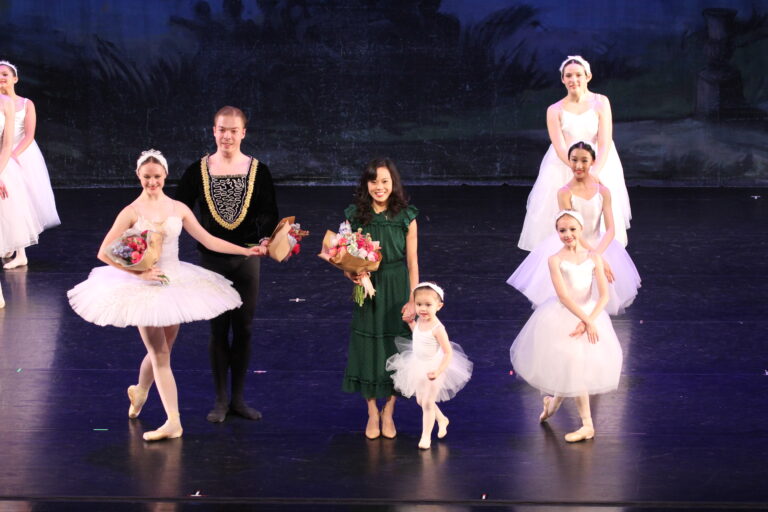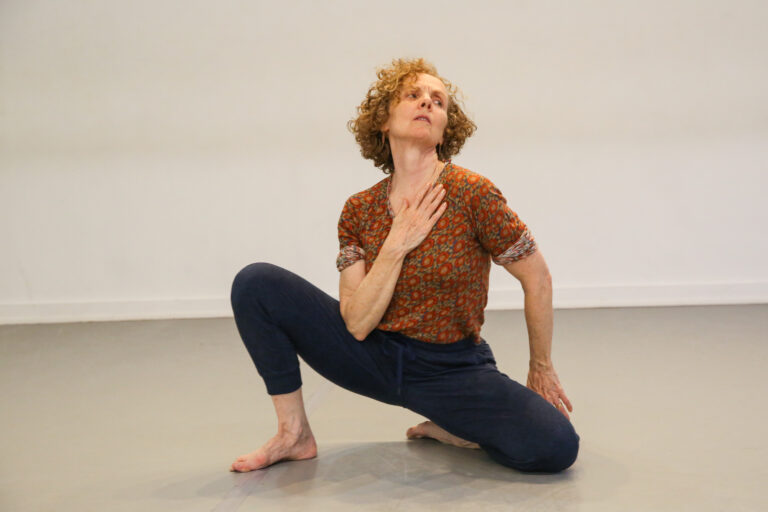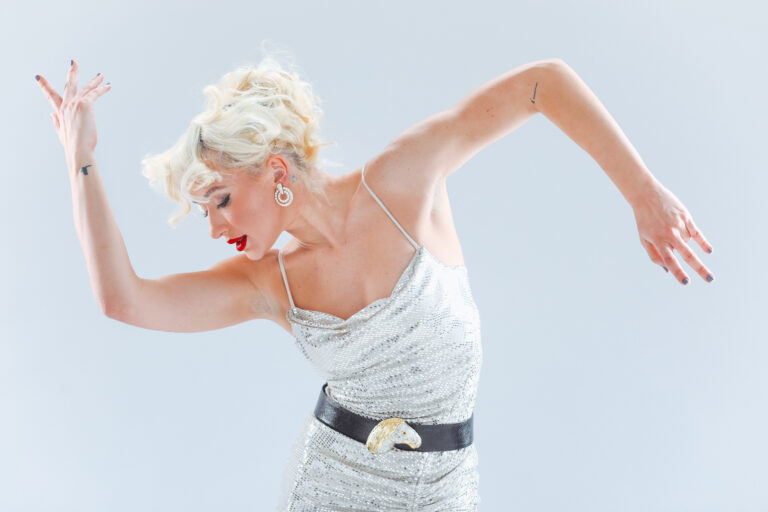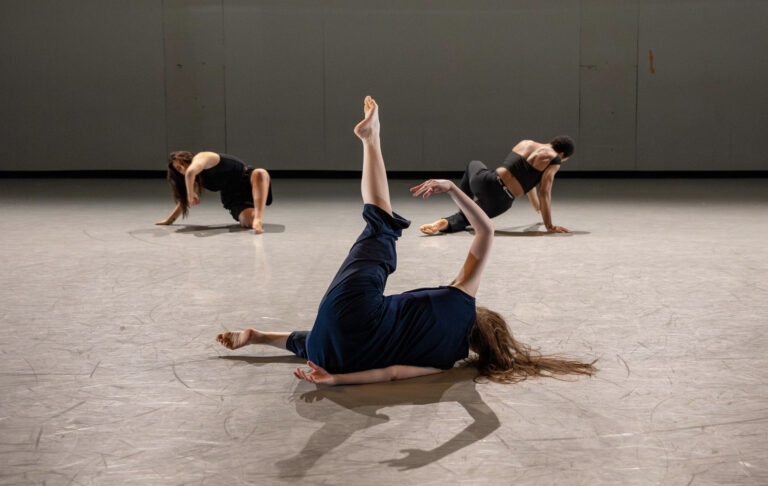
As a longtime open-class teacher in New York City, Emily Bufferd has worked with dancers of every skill level. Whether someone is a working professional, a young child just discovering movement, or an adult who hasn’t taken class in decades, her philosophy is the same: Everybody is a dancer. And Bufferd is there to help you succeed, wherever you fall on your own personal dance journey.
Bufferd trained at Boca Dance Studio, a competition studio in South Florida, from ages 2 1/2 to 18. “I’m a firm believer in home-grown training and don’t think studio hopping is a good idea,” she says. When she was 15, Hurricane Wilma hit near her home, and she and her family evacuated to New York City for two weeks while the power was down in her area. While in Manhattan, Bufferd’s mother took her to classes at Steps on Broadway and Broadway Dance Center, and she fell in love. From then on, she and her mother would take regular trips from Florida to take classes, where she developed meaningful mentor–student relationships with popular educators in the city. After participating in what was then known as the Summer Intern Program (an earlier and shorter version of what is now known as Professional Semester) at BDC when she was 17 years old, Bufferd spent her senior year of high school dreaming of getting back to Manhattan permanently. In fact, she began missing school on Fridays (with her mother’s support), taking a 6 am flight to New York, dancing all weekend, and returning to Florida on Sunday nights just to satisfy her cravings. “It was amazing,” she says. “I built some of my best friendships during that time.”

After graduating high school, Bufferd made the official move to New York City. There, she briefly studied journalism at Baruch College while dancing and assisting teachers at BDC, and taking additional classes at Steps. “I played the audition game and did some small projects, but early on I realized that being onstage was not my favorite thing,” she says. “It was fun, but I had a feeling in my gut that there was something I could love more.” That something was teaching and choreographing. Six months after moving to the city, Bufferd injured her knee. While recovering, she choreographed a piece that she would eventually present at the Steps Performance Lab. “I will never forget how I felt that day,” she says. “After the show, my friends asked me what I wanted to do next, and I said, ‘Let’s make a company.’ ” Thus, in 2008, she created BEings dance. “I am a firm believer that if you work hard, put your hopes and dreams out there, stay the course, and are ethical, eventually the good things that are meant for you will show up.” Thankfully, that’s exactly what happened.
Once her knee healed, Bufferd returned to classes and started assisting teachers Michele Assaf, Sheila Barker, and Shelly Hutchinson. At the same time, she began offering her own classes for children at a studio in Westchester County, as well as classes at donation-based studios like Liberated Movement. “I don’t think you should have the big opportunities right away,” she says. “In order to teach at the major studios, you have to go through some metaphorical growing pains. You should be able to teach all levels of whatever genre you are working in.” In the winter of 2012, Bufferd finally earned her stripes and substitute-taught her first class for Kristin Sudeikis at the Peridance Center. The next day, she subbed for Sheila Barker at The Ailey Extension. BDC made her a regular sub shortly thereafter, and in 2013 she began teaching at Joffrey Ballet School, as well. In 2019, BDC made Bufferd an official faculty member and gave her an official contemporary class; Steps had done the same the year before. Now, she teaches seven open contemporary classes per week, split between Steps and BDC, as well as classes for the Steps Youth Program. “I joke that all of my open classes are ‘beginner,’ but really they are for all levels,” she says. “I make sure to offer variations for the work to support all of the students’ needs.” Beyond her teaching, her company BEings dance is now a production company, home of the Young Choreographer’s Festival as well as Bufferd’s project-by-project concert work. Most recently, she’s presented work in New York City at Baruch Performing Arts Center.
When it comes to her teaching philosophy, Bufferd believes everyone is a dancer. “My classroom is a space that is welcome to all,” she says. “With that, I do all I can to serve each dancer in my space. I strive to lead the room in a way that supports everyone as individuals.”

Here, Bufferd shares why she chose teaching as a career path, as well as the various tools that help her thrive as an educator.
Why she chose to have a career in teaching: “I could always see the excitement my friends got when they were onstage—it was a feeling that hit their hearts and shone through their eyes. I never got that feeling when I was onstage, but I get it from teaching. I get it watching a young dancer figure out how the steps work, as well as watching my 70-year-old dancer have joy and freedom in movement. That feeling exists in all realms of dance, and one is no more or less valid than another.”
Tried-and-true teaching warm-up: “I do my own warm-up before I go into class; it includes some core work, stretching, pliés, tendus, and a balance exercise.”
Must-have teaching attire: “Lululemon studio pants, Alo tearaway snap pants, and Adidas joggers. I also like to wear Apolla Shocks on my feet.”
Her afternoon energy booster: “I love the almond butter Larabars and have those in my bag at all times. They are heavenly.”
The food she can’t live without: “French fries.”
Favorite nondance activities: “I like going to shows, going to the indie coffee shops in the Village where singers perform, seeing art, and wandering around New York City.”
Her ideal day off: “I am a bit of a workaholic, so I like to be a full baked potato and relax on my days off.”
Recommended reading: “Twyla Tharp’s book The Creative Habit has inspired me artistically. When I was 18, she did a book signing at the (now closed) Barnes and Noble on 66th street and I went. In the book, she says ‘There is no entitlement built into success.’ That has become my teaching mantra.”





